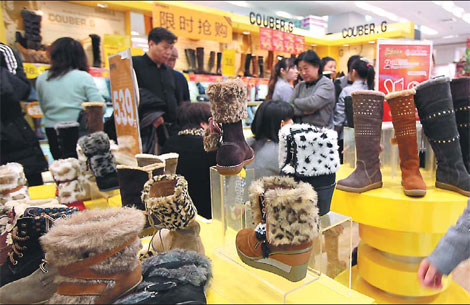Economic growth seen slowing down in 2012
Updated: 2011-12-20 08:03
By Lan Lan and Li Xiang (China Daily)
|
|||||||||
|
A sales promotion at a shopping mall in Beijing. Experts say it will be necessary for the country to try all methods to expand domestic demand in 2012 to cope with the harsh economic situation. A Qing / For China Daily |
Pessimistic predictions agree that the year to come will be challenging
BEIJING - Investment banks, economists and analysts have pessimistic forecasts for the Chinese economy in 2012.
Economic growth is likely to slip to 7.9 percent in 2012, according to predictions from the investment bank Nomura International (Hong Kong) Ltd on Monday.
That's the most pessimistic prediction among the investment banks - the last time that China's economic growth was below 8 percent was 1998 when the financial crisis hit Asia-Pacific - but almost all agree that global economic engine will face a challenging year.
China's economy is shifting from a model of two-digit high-speed growth to one at a relatively lower level, said Xia Bin, an academic adviser to the People's Bank of China (PBOC), on Monday.
It will be necessary for the country to try all methods to expand domestic demand to cope with the harsh economic situation, said Xia.
China's economic momentum is slowing, largely due to a cooling property market and weak external demand, said Zhang Zhiwei, chief China economist at Nomura International.
Economic growth may slow sharply to 7.5 percent year on year in the first quarter and 7.6 percent in the second quarter, according to a report from the bank.
"The sluggish growth will be clearly noticeable in the national economy as well as in peoples' ordinary lives in the first quarter of next year," Zhang said.
Economists are speculating that the PBOC, China's central bank, will loosen its monetary policies in 2012 to support economic growth and provide a boost for the banking industry.
China may relax the reserve-requirement ratios (RRR) for banks four times in 2012, as well as moving towards lower interest rates in the first quarter, Zhang said.
However, Jing Ulrich, chairman of global markets for China at JPMorgan Chase & Co, was less sure that interest rates will be lowered.
"The chances of a drop in interest rates soon are low," said Ulrich.
The current interest rates, especially for current deposits, are actually negative interest rates, she said, adding that the government can employ other measures such as a reduction in the RRR to increase liquidity.
Both economists agreed that the new-yuan loans will increase in 2012. Nomura's prediction is for a rise to 8 trillion yuan ($1.26 trillion) while JPMorgan's outlook is for about 8.2 trillion yuan.
Zhang said that the biggest concern is the rapidly slowing property market, which has reached "a turning point".
The continued weakening of the property market has resulted in a decline in property investment and land transactions.
Forty-nine of the 70 major cities monitored by the government posted housing prices declines in November, compared with 33 in October, the National Bureau of Statistics said on Sunday.
Property investment is likely to continue to decline in the coming two quarters, with a knock-on effect on industries such as steel and cement, said Zhang.
As housing prices and demand continue to fall, steel and other related industries will suffer large losses and overcapacity, he said.
A report released by China International Capital Corp Ltd on Monday was more positive, forecasting that property investment is likely to climb by 14.5 percent year on year in 2012.
Downside risks do exist though, including a slowdown in land transactions and a lack of funding, but the predicted cuts in the RRR will ease the cash flow challenges faced by some real estate developers, according to the report.












